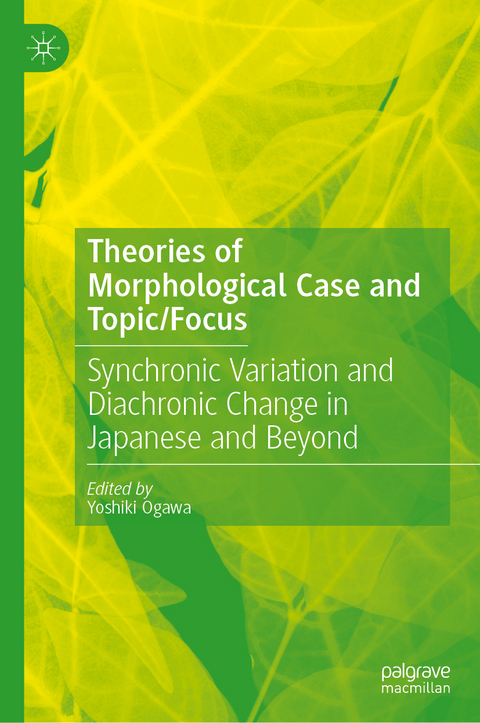
Theories of Morphological Case and Topic/Focus
Springer International Publishing (Verlag)
978-3-031-68314-5 (ISBN)
- Noch nicht erschienen - erscheint am 12.03.2025
- Versandkostenfrei
- Auch auf Rechnung
- Artikel merken
This edited book brings together studies on morphological case in Japanese, English, and Bantu languages, among others, from morphosyntactic, semantic and historical perspectives. Languages are divided into two types in terms of case: nominative-accusative languages and ergative-absolutive languages. Even if we limit our attention to nominative-accusative languages, morphological case on subjects and objects can vary across languages or even within a single language, either synchronically or diachronically. For instance, certain stative predicates in Japanese allow their subjects and objects to be marked with dative and nominative case, respectively, and subjects in adnominal clauses in Japanese can be marked with genitive case; moreover, genitive subject marking in adnominal clauses has decreased over the past few centuries. Licensing relationships between predicates and cases can also have idiolectal, dialectal, and/or geographical micro-variations and intergenerational and/or diachronic micro-change. This book draws parallels and examines differences between examples of European, Asian and African languages, and discusses whether and how licensing of certain morphological cases (especially, subject marking) is related to the grammatical functions such as Topic and Focus. It will be of interest to researchers in Theoretical Linguistics, particularly those involved with Language Variation and Change, Linguistic Typology, Morphology and Syntax, and Generative Grammar.
Yoshiki Ogawa is a Professor in the Graduate School of Information Sciences, Tohoku University, Japan. He is a theoretical linguist that studies the nature of morphosyntax and its relation to phonology and semantics in the framework of generative syntax.
Chapter 1: Current Issues in the Theories of Morphological Case / Yoshiki Ogawa.- Part I: Quirky Case-marking on Subject and Topic/Focus: Its Synchronic Variation and Diachronic Change.- Chapter 2: Variation in the Grammaticization of Subject and Topic across Bantu Languages / Yukiko Morimoto & Nobuko Yoneda.- Chapter 3: The Development of Participial Constructions in the History of English: With Special Reference to Case Assignment and Clause Structure / Satoshi Nakagawa & Tomoyuki Tanaka.- Chapter 4: Discourse Configurationality and the Licensing of Quirky Subjects in the History of English / Hiroyuki Nawata.- Chapter 5: TopP-FinP-TP Interactions and Restrictions on (Multiple) Quirky Case Licensing / Yoshiki Ogawa & Hiroyuki Nawata.- Part II: Morphological Case-marking Alternations on Subject and Object: Their Geographical or Intergenerational Variations and Diachronic Change.- Chapter 6: The Genitive-dative Alternation with Transitive Nominal Predicates in Japanese / Hideki Kishimoto.- Chapter 7: A Quantitative Study of Japanese Case Markers as Language Variation / Satoshi Nambu.- Chapter 8: Diachronic Shrinking of Genitive Subject Clause in Standard Japanese: Evidence from Intergenerational Comparison of Sentence Acceptability / Yoshiki Ogawa, Keiyu Niikuni & Yuichi Wada.- Chapter 9: Nominative/Genitive Conversion in Hichiku Japanese as Focal/Presentational Distinction in the Complementizer Domain / Kazushige Moriyama, Yuichi Wada, Keiyu Niikuni & Yoshiki Ogawa.- Part III: Case-Markers and Adpositions on Objects: Their Acquisition, Interspeaker Variations and Diachronic Change.- Chapter 10: Case-markers and Postpositions in Early Child Japanese / Koji Sugisaki.- Chapter 11: Input Indeterminacy and the PP vs. KP Ambiguity Hypothesis: A View from Interspeaker Variation in Transitive Subject Control Promise / Yosuke Sato.- Chapter 12: After the Demise of Dative Case in the History of English / Tomohiro Yanagi.- Part IV: Morphological Case-marking and LinguisticTypology.- Chapter 13: On Dative Case and Split Ergativity in Japanese / Hiroshi Aoyagi.- Chapter 14: Marked Nominativity in Ryukyuan Languages / Michinori Shimoji & Aoi Matsuoka.- Chapter 15: Case Marking and the Order of Object, Oblique and Verb / Hisao Tokizaki & Yasutomo Kuwana.
| Erscheint lt. Verlag | 12.3.2025 |
|---|---|
| Zusatzinfo | X, 450 p. 63 illus., 18 illus. in color. |
| Verlagsort | Cham |
| Sprache | englisch |
| Maße | 148 x 210 mm |
| Themenwelt | Geisteswissenschaften ► Sprach- / Literaturwissenschaft ► Sprachwissenschaft |
| Schlagworte | abstract case • adjacency condition • Generative Syntax • Language contact • language variation • Linguistic typology • micro-variations • split ergativity • topic-prominence vs. subject-prominence |
| ISBN-10 | 3-031-68314-5 / 3031683145 |
| ISBN-13 | 978-3-031-68314-5 / 9783031683145 |
| Zustand | Neuware |
| Informationen gemäß Produktsicherheitsverordnung (GPSR) | |
| Haben Sie eine Frage zum Produkt? |
aus dem Bereich


